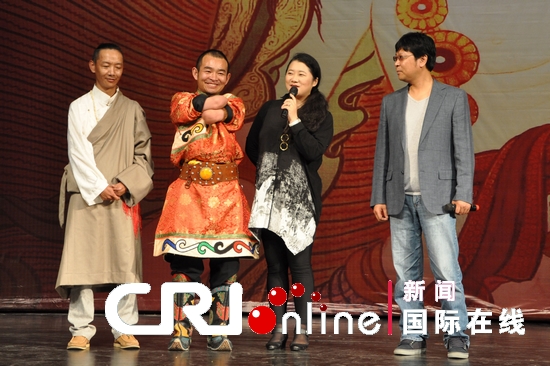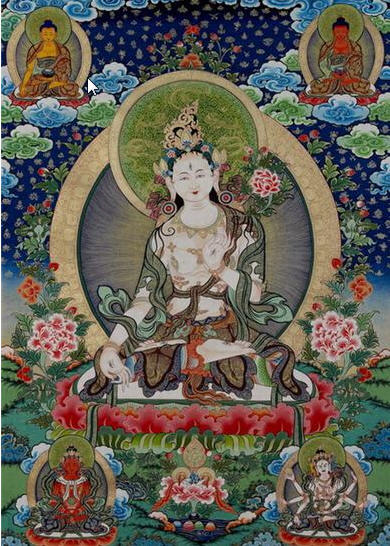
Film on Tibetan Thangka picked for Cannes screening
Xinhua, May 8, 2012
-
A Tibetan-language drama feature depicting traditional Thangka painters has been selected for screening in the upcoming Cannes Film Festival this month, according to the film's director.

The film's cast and crew meet the press at the premiere in Beijing May 7. [CRI]
The film, titled "Thangka," is directed by Chinese mainland director Hasi Chaolu. It focuses on a handicapped young Thangka expert Gaga who uses only his upper arms to paint his works. Thought to be the reincarnation of a great painter, he is brought from his grasslands home to Lhasa to be trained.
With 1,300 years of history, Thangka paintings are rich in color and elegant in lines. They depict various illustrations of Tibetan cultural features. The art was listed as a piece of national intangible cultural heritage by the central government in 2008.
The film ponders on the theme of traditions versus innovations by delineating Gaga's struggle between the master's expectations and his own painting habits as well as his troubled relations with the master's jealous son, who is filial but scorned for painting his own Thangka works in a Picasso style.
"Instead of didactic publicity, I want to present a real Tibet and its changes through stories -- its modernization, its freedom, its people's pursuit of art and nature," said 46-year-old Hasi Chaolu Monday after the film's premiere.
Hasi Chaolu said many foreigners he knew had misunderstandings about Tibet and he hoped the film could clear their misconceptions and doubts.

White Tara. With 1,300 years of history, Thangka paintings are rich in color and elegant in lines. [China.org.cn]
With a two-year rumination and a 10-million-yuan (1.6 million U.S. dollars) investment, the film cast real-life Thangka prentices who have no acting experiences before for the roles of all Thangka learners -- with the exception of the master's son -- in order to ensure a realistic touch.
During the premiere ceremony, Yundan, who plays Gaga, revealed that he had been learning at a Thangka school for seven years and only agreed to act after persuasions from the filmmakers.
"I don't like seeing my myself on the big screen. It's weird. I'm happy that now the shooting is over and I can soon go back to focus on my Thangka," said Yundan.
According to Hasi Chaolu, the film will focus on overseas publicity and showings before coming back to the Chinese mainland for national screening.